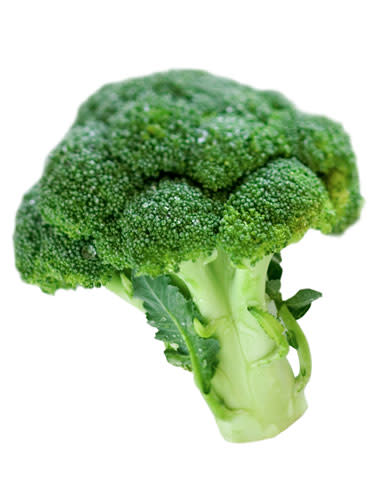This New Type of Broccoli Just May Save Your Life-and Your Budget

By Kristen Fischer
How's this for a happy accident: While researchers at the University of Illinois were trying to boost broccoli's anti-cancer properties, they may have also found a way to extend the veggie's shelf life. Jack Juvik, PhD, a professor in the crop sciences department at the university, whose study was recently published in PLOS ONE, says that putting one substance, methyl jasmonate (MeJA), on the crop before it's harvested, and another, 1-methylcyclopropene (1-MCP), after the harvest ups the veggie's cancer-fighting power-and makes the produce last longer. Photo by Thinkstock
Related: Discover 50 surprising foods under 100 calories.
Just how much longer-and more powerful? "We found that the combined treatment approximately doubled the shelf life when stored at standard refrigerator temperature from about 7 to 15 days while enhancing anticancer activity by 60%," says Dr. Juvik.
More potentially good news-if you're not a huge broccoli fan, that is. Elizabeth Jeffery, PhD, the study's co-author and a nutrition professor also at the University of Illinois, says that it'll take fewer servings per week than the current recommended three to five to cut your risk for certain cancers by 40 to 50%. "That's the sort of direction we'd like to go with our research," she says. "Our aim is to help farmers produce a crop that ensures people get all of the health benefits associated with broccoli."
Related: Try these easy exercise drills to slim down fast.
And the substances with which the researchers are treating the broccoli are nontoxic compounds naturally produced in plants and are widely recognized as safe. "It's something that doesn't raise any eyebrows," Dr. Juvik says. One is already approved by the U.S. Environmental Protection Agency.
The goal is to bring this better-for-you broccoli to your supermarket soon. It shouldn't take long; a grower just has to be willing to use the product. And while the new-and-improved version isn't likely to go bad as quickly as the currently available kind, you may not have to pay much of a premium for it. Adding the substances to the crops isn't very expensive, explains Dr. Juvik. "It's cheap material and you need tiny amounts."
Before offering it to consumers, though, Dr. Juvik wants to conduct more research to see if they can get the same results by combining MeJA and another form of 1-MCP into one treatment instead of two.
You Might Also Like:
The 6 Best Foods for Sensitive Stomachs
The 10 Healthiest Snacks Around
10 Unexpected Foods to Avoid Before Having Sex
